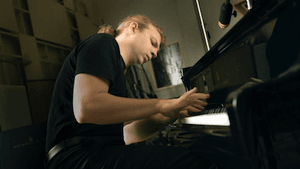Stay in the Loop
BSR publishes on a weekly schedule, with an email newsletter every Wednesday and Thursday morning. There’s no paywall, and subscribing is always free.
All-Russian program with a Russian piano master
Pianist Denis Kozhukhin with the Philadelphia Orchestra

Denis Kozhukhin is a man to watch.
The young Russian pianist, trim and golden haired, gave a stunning performance of Tchaikovsky’s beloved First Piano Concerto in B-flat minor last weekend. Under the keen baton of Stéphane Denève, with the Philadelphia Orchestra at its brilliant best, the work burst with freshness and immediacy not often evident in performances of a concerto long regarded as a dependable old warhorse. The First beguiles with its rush of impetuous energy, yet the three movements are thematically connected with great subtlety, a sign of measured deliberation. The illusion of spontaneity, even restlessness, throughout is the result of careful planning and refinement by a composer who is a master of musical communication.
Complex yet accessible
Tchaikovsky completed the first version of the work in 1875 when he was 34, and despite a few rocky starts, it soon became a popular favorite. Even listeners outside the classical spectrum responded to Van Cliburn’s recording of the concerto in 1958, and it sold more than a million copies. This is a work of staggering complexity that can absorb the most analytical scholar, yet its explosive passion, soaring lyricism, and rhythmic delights are immediately accessible to a large general audience.
Kozhukhin’s virtuosity is impressive (how does he elicit those warm high notes without sounding shrill?) alongside his unerring technique and seamless partnership with the orchestra. Denève kept the pace brisk — perhaps just a hair too brisk — but never flagging in electricity. This was a performance driven rather than monumental, kinetic rather than sculpted. The piano dominated throughout, a tribute to Denève’s sensitivity and control of the ensemble. Kozhukhin’s engagement with the work launched with its opening chords, gathered momentum, and continued without a break until the last spectacular scamper up the keyboard that brings the work to its exultant conclusion.
After several curtain calls and a standing ovation, Kozhukhin played an encore, the Bach-Siloti Prelude in B Minor. (Siloti, a Russian pianist, conductor, and composer, was one of the advisors who helped Tchaikovsky revise the concerto.) This work always sounds vaguely New Age to me, with Bach’s penchant for unexpected harmonies and the stream-of-consciousness semiquavers of a Baroque George Winston. Here Kozhukhin displayed a phenomenal sense of control and delicacy, with gentle rubatos and a calming touch that was almost celestial. The work seemed longer than the time it occupied; you could say time, for a few minutes, seemed to stand still. He’s a remarkable pianist, one to watch, but more important, to hear.
More favorites
The orchestra’s all-Russian program opened with its first performance of the hymn-like Andante Cantabile from Tchaikovsky’s String Quartet No. 1 in D Major, Op. 11 (arranged by Stokowski). Their rendition was smooth and flowing, with a tender solo passage near the end by Priscilla Lee, associate principal cellist. Hearing the cellos and basses in full voluptuous voice is, as Jane Austen might have said, a delicious sensation.
The second half of the program began with Boris Godunov, a Symphonic Synthesis of the opera about Tsarist Russia by Modest Mussorgsky. The Stokowski orchestration demands a full orchestra occupying the entire stage of Verizon Hall, including chimes, gongs, a glockenspiel, cymbals, and various drums. The haunting sound of distant cathedral bells conjured by this percussion lingered through much of the performance. Church bells in old cities sometimes have minds of their own; the unpredictability of these chimes and overtones actually added to the authenticity of the listening experience. The orchestra wove ghostly triads with missing thirds, and whispered melodies of Old Russia, into a tone portrait of an era, an episode in Russian history, and a fragment of the universal spirit.
The concert concluded with the 1812 Overture by Tchaikovsky, revealing that the bombastic showpiece indeed deserves a place on the concert stage. It’s a feisty little prelude with moments universally recognized, a shot of musical espresso at the end of a most satisfying meal.
What, When, Where
Russian Favorites. The Philadelphia Orchestra. Andante cantabile from the String Quartet #1 in D major, Op. 11; Piano Concerto #1in Bb flat minor, Op. 23; 1812 Overture, Tchaikovsky. Boris Godunov, a Symphonic Synthesis (arr. Stokowski), Mussorgsky. Denis Kozhukhin, piano. Stéphane Denève conducted. October 20-22, 2016 at the Kimmel Center, 300 S. Broad Street, Philadelphia. (215) 893-1999 or philorch.org.
Sign up for our newsletter
All of the week's new articles, all in one place. Sign up for the free weekly BSR newsletters, and don't miss a conversation.

 Linda Holt
Linda Holt